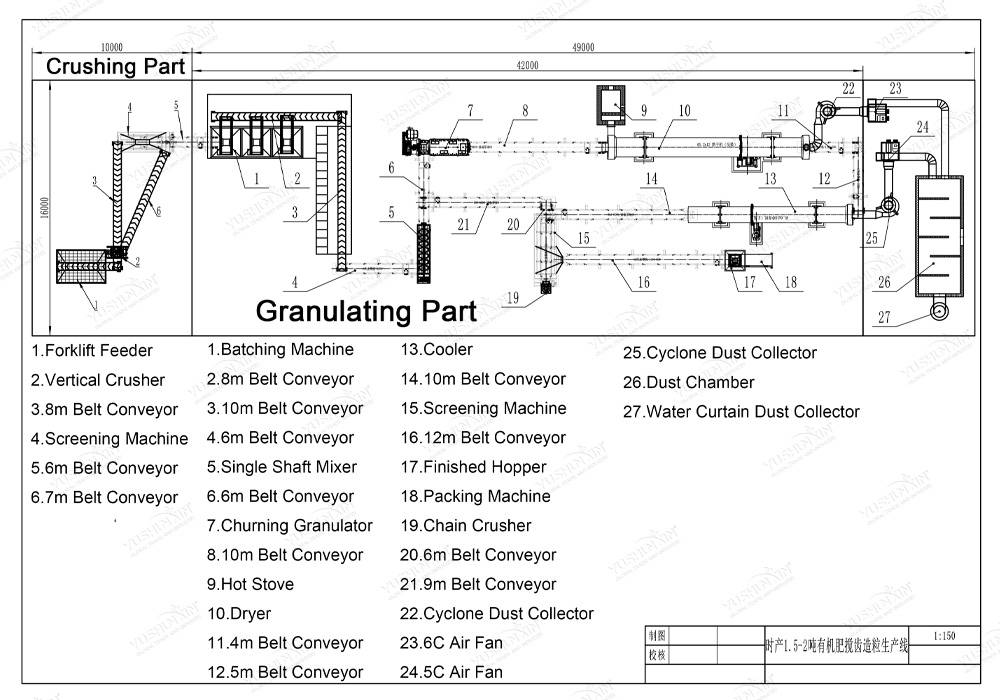







Dolomite Limestone (Calcium Magnesium Carbonate – CaMg(CO₃)₂):
If magnesium content is needed in the fertilizer, dolomite is used instead of pure limestone.
Gypsum (Calcium Sulfate – CaSO₄):
Sometimes added to provide sulfur and improve soil structure.
Organic Matter or Compost:
Blended with limestone in some formulations to enhance soil conditioning properties.
Granulation Binders:
If the limestone is processed into granules or pellets, binding agents like bentonite clay or lignosulfonates may be added to help form and stabilize the granules.
Trace Minerals:
Occasionally, micronutrients such as zinc, iron, or boron are added to create fortified limestone fertilizers.
The cost of each production line varies depending on production capacity, degree of automation, and specific needs. Fill in the form below and we will provide you with an accurate quote!
If you're interested in our fertilizer making equipment, please submit your requirements and contacts and then we will contact you in two days. We promise that all your information won't be leaked to anyone.
- The company was founded in 2005 and has been focusing on the research and development and manufacturing of organic fertilizer equipment for 20 years. It has built a 40,000m large-scale organic fertilizer equipment production base, using advanced granulation, drying and screening technologies to improve production efficiency and product quality.
- A self-operated import and export enterprise with more than 80 professional engineers worldwide, serving more than 100 countries and regions around the world, 5,000+ customer service cases, 10 processing centers, 3 laser cutting machines, and more than 60 equipment of various types.
- Maintaining long-term and extensive cooperation with many scientific research institutes and universities, with a professional R&D team, it can continuously optimize equipment performance according to market demand.
- High-strength wear-resistant materials, carbon steel Q235/Alloy are selected to ensure that the equipment is durable and reduce maintenance costs.
- Adopting intelligent control systems to improve the level of production automation and reduce manual dependence.
- ISO, CE, SGS international certification
- With large-scale production capacity, it can meet different production capacity requirements (small, medium and large production lines).
- A full range of equipment models, suitable for the production of various types of fertilizers such as organic fertilizer, compound fertilizer, biological fertilizer, water-soluble fertilizer, liquid fertilizer, etc.
- Personalized design can be provided according to customer needs, including production capacity, site layout, environmental protection standards, etc.
- Provide a complete set of production line solutions, including equipment selection, installation and commissioning, technical training, etc.

- Direct factory supply, reducing the middleman link, and the price is more competitive.
- The equipment has high energy efficiency, reduces energy consumption, and helps customers reduce long-term operating costs.
- Direct factory supply, reducing the middleman link, and the price is more competitive.
- The equipment has high energy efficiency, reduces energy consumption, and helps customers reduce long-term operating costs.
Ecuadorian Customers Highly Praise the Wastewater Dewatering Machine
Vietnam Customer’s High Praise for the Potassium Fertilizer Production Line
The Mexican Fertilizer Line Was Successfully Installed
Our fertilizer production equipment has been successfully delivered to Australia without any damage.